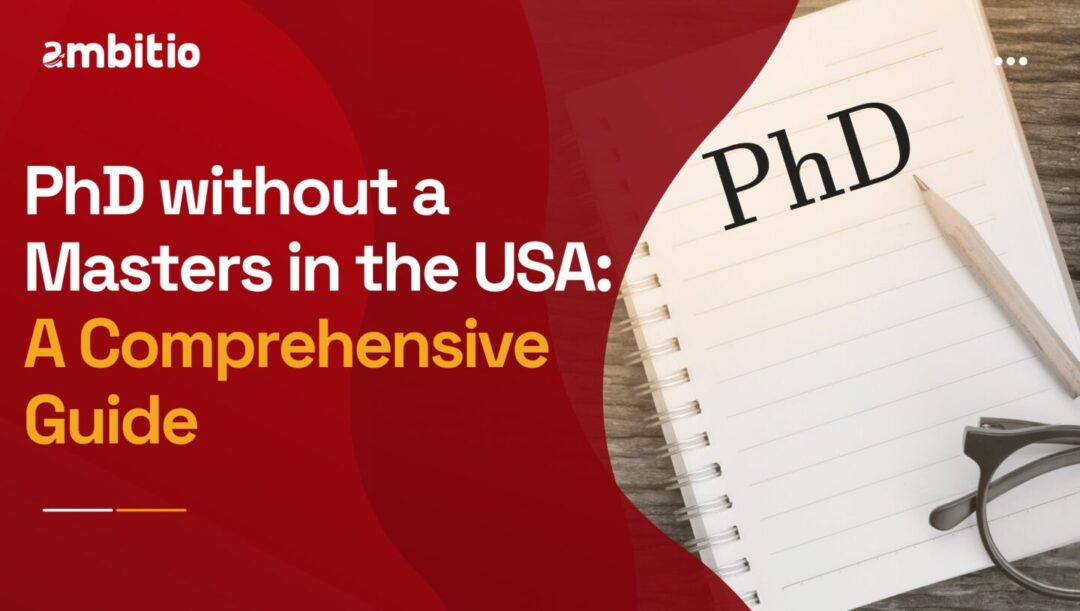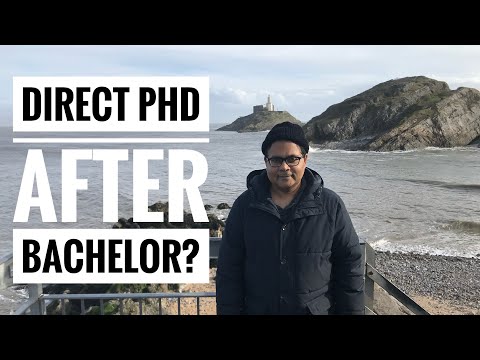

Can You Get a PhD without a Masters?
- Applying to a PhD
Yes, it’s possible to get a PhD without first having a Masters degree .
The conventional route for someone who earns a PhD is to pursue a Bachelor’s degree, followed by a Masters degree and then a PhD. However, several students opt to bypass a Master’s degree by enrolling onto a doctoral programme as soon as they complete their undergraduate degree.
Before we discuss how this can be done, it is worth mentioning the advantages and disadvantages of this route.
Advantages of Applying to a PhD without A Masters
The motivations for undertaking a PhD immediately after an undergraduate course are largely in saving money and time. This is because you will essentially eliminate a year of study. Another advantage of immediately enrolling onto a doctorate degree is project availability. If you find a project that you’re really interested in, it’s unlikely that it will still be available in a years’ time. Therefore, bypassing a Masters and enrolling directly into a PhD will increase your chances of securing the research project before it becomes unavailable.
Disadvantages of Applying to a PhD without A Masters
Although a Masters degree will add a year onto your academic journey, it can be incredibility helpful for your development and can help prepare you for a doctoral degree.
Not having a Master’s degree may prove to be a hindrance during your application process. This is because many other students will also apply to the same research projects, and it’s likely that the majority will hold a Masters. This will put you at a disadvantage to them.
Besides this, the dissertation project you’ll be required to undertake on a Master’s programme will provide you with a taste of what it is like to work on a research-based project. In addition to this, it’s likely that you’ll be able to select your own dissertation topic. As such, you can explore a specific field you’re interested in in further detail. This is a great way to confirm that both research-based work and the specific field you’re interested in are right for you before committing the next few years to it via a PhD.
Another advantage to the dissertation project associated with a Masters degree is the opportunity it provides you with to work closely with a project supervisor. This will help you understand the PhD student-supervisor relationship and communication frequency that works best for you. You can then use this knowledge to find supervisors who would compliment you when it comes time to find a PhD project to apply to. For tips on how to find a great PhD supervisor, check out our supervisor guide .
PhD without a Masters – How Does It Work?
To be considered for a PhD without a Master’s, at a minimum you will be expected to have a Bachelors degree. For students looking to enrol onto a STEM (Science, Technology, Engineering and Maths) PhD, a relevant Bachelors in a 3-year undergraduate course is usually expected. However, this is not the case for students looking to apply to non-STEM PhDs. Rather, students looking to apply to doctorates in subjects such as those surrounding Arts and Humanities are usually expected to have a relevant Bachelors from a 4-year course.
In addition to this, you will need to have demonstrated strong academic performance during your undergraduate course. This means that your Bachelors will need to be at least a UK Upper Second-Class Honours (2.1) for nearly all institutions to consider you.
Should you be accepted into a PhD programme without a Masters, the usual process will be to first register you as an MPhil student. You will then have a year to prepare and submit a thesis. Your thesis will need to detail the research you have carried out within that year and outline how you intend to continue it into a full PhD study. There are three outcomes of this MPhil thesis review:
- Failure and you’re not awarded anything.
- You pass, however, the supervisor doesn’t believe you’ve demonstrated strong research skills. You’re awarded an MPhil but they do not upgrade your course to a PhD programme.
- You pass and the supervisor believes you have proven yourself as a capable researcher. Your course is upgraded to a PhD as opposed to you being awarding an MPhil.
For more information on these outcomes, read the outcomes section of our PhD Viva guide .
Integrated PhD
Some universities offer Integrated PhD degree programmes (also known as an Integrated Masters degree). These are four-year programmes comprising of a one-year Masters degree immediately followed by a three-year PhD degree. These can prove a great option for graduate students who are looking to undertake a PhD without a Masters but are struggling to meet the eligibility requirements. You can read about the many benefits of integrated degrees here .
Finding a PhD has never been this easy – search for a PhD by keyword, location or academic area of interest.
PhD without a Bachelors – Is It Possible?
Yes, it is possible to get a PhD without a Bachelor’s, however, this is extremely uncommon.
When this occurs, it is almost always reserved for very mature individuals. For example, an individual may not be in active academia but still may have significantly contributed to their field. This contribution could be through the work they have undertaken as part of their career, or as part of a long-term study project, they have undertaken out of self-interest.
In either case, the individual would need to prove that they have extensive experience in their field and have directly contributed to new knowledge within it. The key factor here is that their work has pushed the boundaries of existing knowledge. It is not enough for an individual to be regarded as an expert in their field – they must have contributed something new and meaningful. It’s common for individuals awarded a PhD through this means to have produced several publications within their lifetime. It’s also common for the individual to have gained several professional accreditations within their field before even being considered suitable for a PhD research degree.
Universities Offering PhD without a Masters
Unfortunately, there is not a centralised list of universities which offer PhDs without a Master’s degree. The reason for this is that the edibility requirements differ from PhD to PhD and from department to department.
Therefore, you will need to check the guidelines for each individual university and the requirements for each specific PhD you’re interested in.
Should you find a PhD programme you can apply to with a Bachelors, make every effort to make your application as strong as possible. This is because you will be competing against other candidates, most of who will have a Master’s degree.
Not only can you strengthen your application by having a Bachelors with a First-Class Honours (1st), but you can also do so by showing the traits of a successful researcher. This includes showing a genuine interest in the project, a high work ethic, and exceptional communication skills.
Additionally, a strong letter of recommendation from a respected university lecturer will prove very beneficial. This is especially true if the lecturer supervisors his or her own PhD students. This is because the lecturer will understand the skills required for an adept research student.
For more advice on how to apply to a PhD degree, check out our Application Process Guide.
Browse PhDs Now
Join thousands of students.
Join thousands of other students and stay up to date with the latest PhD programmes, funding opportunities and advice.
2024 Best Universities That Offer PhD Without Masters
It may sound like a dream, but universities that offer PhD without a masters do exist.

Imagine fast-tracking your way to becoming a doctor in your field, skipping the traditional master’s step, and diving straight into deep, meaningful research. This article is your guide to understanding this unconventional yet rewarding path.
Editorial Listing ShortCode:
We’ll explore the ins and outs of taking this leap to help you decide if this bold academic journey aligns with your aspirations and goals.
Universities That Offer PhD without a Masters Degree

Can you get a doctorate without a masters? For some, the answer is yes. In PhD programs without masters requirements, you can start working on your PhD right after earning your bachelor’s degree. This means you can focus on intensive research and specialized studies sooner.
It’s a path that may suit you if you’re keen on deepening your knowledge and expertise without the intermediate step of a master’s program. Typical eligibility criteria for these programs include:
- Strong undergraduate academic record
- Research experience
- Recommendation letters
- Well-crafted statement of purpose
- Standardized test scores (if required)
According to the Bureau of Labor Statistics (BLS) , higher education often leads to better job prospects and higher earnings. This route not only saves time but can potentially set you up for promising career opportunities.
You’ll be expected to start your research early. This could be a great fit if you’re already clear about your academic interests and ready to commit to a rigorous research schedule.
Advantages of Fast-Tracking to PhD
Deciding to go straight for a PhD without a master’s degree can be a big step toward your future goals. Here are some potential benefits for considering PhD online programs without masters requirements:
- Speed up your journey : By skipping a master’s program, you may get to your career goals faster.
- Save money : Like any college program, earning a master’s degree can be expensive.
- Immediately deep dive into your interests : Passionate about your field? You may jump straight into advanced studies and research.
- Unique opportunities : These programs can help open doors to rare and exciting research chances, placing you at the forefront of innovation early in your career.
- Stand out : Earning a PhD is a powerful statement about your ambition and skills.
Stepping directly into a PhD program may allow you to fast-track your ambitions and pave the way to a fulfilling future.
Disadvantages and Challenges of Direct PhD Programs

Jumping into a PhD without a master’s degree takes courage. It’s crucial to know the hurdles that might pop up before you start researching PhD programs online without masters requirements.
These are some challenges you may encounter:
- Rapid pace : You’ll likely face a steep learning curve without the preparation a master’s program can provide.
- Immediate research pressure : You’re expected to start producing original research right away.
- Fewer networking opportunities : Skipping a master’s program means missing out on making those crucial academic connections that may be valuable down the line.
- Tougher funding : Funding opportunities often lean toward those with master’s degrees, so securing financial support might be more challenging.
- Self-doubt : Without the stepping stone of a master’s, you might question if you’re ready for this big leap.
According to the NSCRC , with more people pursuing advanced degrees, the academic world is getting more competitive. Navigating these challenges requires resilience and a clear vision of your goals. Choosing a direct PhD route is about weighing these hurdles against your determination and passion for your field.
How to Choose a Doctorate without a Masters Degree

Choosing the right PhD program is key. Here are some important factors to consider:
- Accreditation : Accreditation is like a quality stamp for the program, ensuring that it meets certain academic standards. You can find more information at the S. Department of Education – Accreditation .
- Financial aid and scholarships : Cost can be a big factor, and having financial aid or scholarships can make a huge difference. You can visit the FAFSA website for more information.
- Faculty expertise : You want to learn from the best and ensure they have experience in your area of interest.
- Research opportunities : This is your chance to get hands-on experience in your field.
- Program structure and flexibility : It’s important to consider class schedules, online vs. in-person options, and the balance between coursework and research.
Choosing the right doctorate program is a personal decision that will shape your academic journey. Taking the time to weigh these factors carefully can help you find the best choice to fit your goals and needs.
Applying to Universities That Offer PhD without a Master’s Degree

Applying for a PhD program is like presenting your academic story. Here are some tips to help make each part of your application a testament to your passion and potential:
- Your research proposal : This is a window into your interests. Show your enthusiasm and readiness for the field by making it clear, engaging, and indicative of your ability to bring fresh ideas.
- Letters of recommendation : These are your personal champions, so choose mentors or professors who know your strengths intimately and can confidently vouch for your PhD readiness.
- Showcase your research journey : Research experience is a crucial part of your narrative. Highlight your involvement in projects, papers, or presentations.
- Ace the interview : Be prepared to discuss your motivations, research interests, and how you envision your growth in the program.
Your application is a holistic reflection of your academic identity. It should showcase your achievements and excitement for research and knowledge.
Do You Need a Masters to Get a PhD?

While many paths to a PhD traditionally start with a master’s, there’s a growing trend of programs allowing students to jump straight into doctoral studies from their bachelor’s programs.
This option may be perfect for those who are clear about their research interests and ready to dive into academic exploration. If you’re passionate, determined, and have a clear vision for your research, a direct route to a PhD may be your path forward.
Universities Offering Online PhD Without Masters Degree Programs
Methodology: The following school list is in alphabetical order. To be included, a college or university must be regionally accredited and offer degree programs online or in a hybrid format.

Capitol Technology University offers a PhD in Technology with two pathways for students who may not hold a master’s degree. Applicants may either already hold a doctoral degree or earn an MS in Research Methods while earning their PhD. CapTech’s program is fully online, and residencies are not required.
Capitol Technology University is accredited by the Middle States Commission on Higher Education.

Clemson University offers a PhD in Healthcare Genetics and Genomics. Applicants must hold at least a bachelor’s degree in a related field with a 3.0 cumulative GPA. Applicants who hold a master’s in the field may be given preference. The program is fully online, and courses are in a synchronous format.
Clemson University is accredited by the Southern Association of Colleges and Schools Commission on Colleges.

Indiana University offers a PhD in Music Therapy through the Purdue School of Engineering and Technology at IUPUI. Students who do not already hold a master’s degree can earn a Master’s in Music Therapy through the program. The program requires the completion of 90 credit hours, including a dissertation, and is fully online.
Indiana University is accredited by the Higher Learning Commission.

Students who do not hold a master’s degree may apply for a PhD in Computer Science through Mississippi State University. The program is fully online and does not require campus visits. Courses follow a semester schedule, and there are start dates in the fall and spring. Applicants are not required to submit GRE or GMAT scores.
Mississippi State University is accredited by the Southern Association of Colleges and Schools Commission on Colleges.

Students who do not hold a master’s may earn a PhD in Computer Science through Nova Southeastern University’s bachelor’s track. The program requires the completion of 66 credits and is available fully online or on campus. The program has start dates in August, January, and May and follows a semester schedule. NSU is an NSA-designated school.
Nova Southeastern University is accredited by the Southern Association of Colleges and Schools Commission on Colleges.

Saybrook University offers a PhD in Clinical Psychology program that is fully online. Students who do not hold a master’s degree must complete 103 to 109 credits to graduate, while those who do have a master’s in a related field must complete 100 to 106 credits.
The program can typically be completed in 5 years. It offers several specializations that may be declared, including Applied Psychophysiology, Creativity Studies, and Jungian Studies.
Saybrook University is accredited by the Senior Commission of Western Association of Schools and Colleges.

The University of Arizona offers a PhD in Nursing to students who hold a BSN through its BSN-to-PhD program. The program is mostly online, but short residencies are required. The program can potentially be finished in 4 years when attended full-time. Courses follow a semester schedule, and the completion of 79 credits is required to graduate.
The University of Arizona is accredited by the WASC Senior College and University Commission.

The University of Central Florida offers a BSN-to-PhD in Nursing program for those who do not hold a master’s degree in nursing. All coursework is online, but short intensives on campus are required throughout the program. Applicants are not required to submit GRE scores.
The University of Central Florida is accredited by the Southern Association of Colleges and Schools.

The University of Oklahoma offers a PhD in Nursing with a fast-track to PhD option for students who have a BSN but not a master’s degree. All coursework is fully online. The program can potentially be finished in 36 months, and there are start dates in the fall, spring, and summer. The completion of 78 credits is required to graduate.
The University of Oklahoma is accredited by the Higher Learning Commission.

The University of Wisconsin–Milwaukee offers a fully online program for a PhD in Nursing. Students with only a BSN may apply but must complete 15 additional credits before entering the program. The program starts every other year during the summer semester. It can potentially be completed in 3 years.
UWM is accredited by the Higher Learning Commission.
Advance Your Career: Starting Your PhD without a Masters Degree

Starting your PhD journey without a master’s degree can be a bold step forward in advancing your career, particularly if you pursue some of the highest paying doctorate degrees . It’s a path that speaks to those ready to dive into deep academic waters, driven by passion and a clear vision for their future, with the added potential of high financial rewards in cutting-edge and high-demand areas.
If this resonates with you, you can start exploring accredited universities that offer this opportunity, including those providing online PhD programs for working professionals . These flexible programs are designed to accommodate your busy schedule, allowing you to balance your professional responsibilities with your academic pursuits. Your aspirations and determination may fast-track you on your way to becoming an expert in your field!

Do You Need a Master’s to Get a Ph.D.?
BestColleges.com is committed to delivering content that is objective and actionable. To that end, we have built a network of industry professionals across higher education to review our content and ensure we are providing the most helpful information to our readers.
Drawing on their firsthand industry expertise, our Integrity Network members serve as an additional step in our editing process, helping us confirm our content is accurate and up to date. These contributors:
- Suggest changes to inaccurate or misleading information.
- Provide specific, corrective feedback.
- Identify critical information that writers may have missed.
Integrity Network members typically work full time in their industry profession and review content for BestColleges.com as a side project. All Integrity Network members are paid members of the Red Ventures Education Integrity Network.
Explore our full list of Integrity Network members.
- You do not need a master’s degree to get a Ph.D. at many universities.
- Your professional experience may make a master’s unnecessary.
- Skipping a master’s features many benefits and some potential drawbacks.
- You can earn a Ph.D. in a different field than your master’s by taking extra classes.
It makes sense to think about college degrees as steps. A bachelor’s represents the first, a master’s the second, and a doctorate the third and final. Each new step builds upon the knowledge and skills the previous one introduces.
You certainly need a bachelor’s degree to enter a Ph.D. program , but do you need a master’s to get a Ph.D.? Well, the answer is no for many programs. Some top universities let you start a Ph.D. without a master’s.
Ph.D. programs without a master’s requirement feature a modified curriculum, ensuring you experience the same learning outcomes as degree-seekers who earn a master’s and Ph.D.
Featured Online Doctorate Programs
Can you get a ph.d. without a master’s.
Yes. Fields where you can get a Ph.D. without a master’s include clinical psychology and government. These and other programs combine the master’s and Ph.D. curricula.
Not all universities or academic departments let you earn a Ph.D. without a master’s degree. However, they may let you apply if you hold a master’s in a different field. Some of these programs include healthcare administration , human services , and criminal justice .
College admissions counselors and university websites can help you understand these and other application requirements. Some programs may offer conditional admission based on your professional experience or other factors.
Earning Your Ph.D. Without a Master’s: Pros and Cons
Earning a Ph.D. without a master’s degree features many potential benefits and some drawbacks. Use this information to discover which academic path works best for you.
- Applying to only one graduate program saves time you can dedicate to your studies.
- Moving only once to attend graduate school saves you money on relocation costs .
- Staying at the same university lets you build lifelong relationships with like-minded peers and professors.
- Some schools award a master’s degree if you cannot finish the doctorate.
- You may be able to save some money on application fees and tuition costs by applying to just one program.
- Extra academic requirements mean you may graduate later than your peers.
- You may feel frustrated if your academic or professional goals change in the middle of your program.
- You may feel overwhelmed with taking extra classes, especially if you work while in school.
- You may lack the graduate-level research skills necessary for doctoral classes.
Reasons You Don’t Need a Master’s to Get a Ph.D.
Your personal and professional background may convince universities that you can earn a Ph.D. without a master’s. But keep in mind that policies vary by school and program.
- Reason 1: Many years of professional experience gives you the same knowledge and skills students learn in master’s-level classes.
- Reason 2: You hold industry certifications or received awards in the field you want to study at the doctoral level.
- Reason 3: You can dedicate all of your time to the Ph.D.
- Reason 4: You want to reach your career goals as soon as possible.
Frequently Asked Questions About Getting Your Ph.D. Without a Master’s
How hard is it to earn your ph.d..
A Ph.D.’s difficulty depends entirely on you. You may struggle in a Ph.D. program if you lack the writing and research skills necessary to complete your dissertation. Other challenges include balancing school, work, and family.
Discuss these concerns with colleagues, family, and friends before contacting university admissions departments. Counselors can help you make an informed decision.
How long does it take to earn a Ph.D. without a master’s degree?
Some Ph.D. programs, even those requiring a master’s for admission, take up to eight years to complete. However, remember that many factors impact how long you need to graduate. Receiving graduate credit for life experience, taking more classes each semester, and defending your dissertation successfully on the first try can help you graduate sooner than your peers.
Can you get a Ph.D. in a different field than your master’s?
For some schools and programs, yes. You can fill in the gaps in your academic knowledge and skills by taking more classes than your peers. Review universities’ admission requirements closely and reach out to admissions counselors with questions.
Explore More College Resources

How Much Does a Ph.D. Cost?
The average cost of a Ph.D. is over $40,000 per year. But many programs offer competitive packages that offset some or all of the costs.

by Jane Nam
Updated October 11, 2023

Can You Take Graduate Courses as an Undergrad? Should You?
Most universities let undergrads enroll in graduate classes. Learn more about the benefits of taking grad classes and how to prepare for your first graduate course.

by Genevieve Carlton, Ph.D.
Updated August 26, 2022

How to Choose a Graduate Program
Graduate school can be an exciting pursuit. Deciding on grad school involves consideration of cost, program, location, and time.

by Juliann Scholl, Ph.D.
Updated March 21, 2023

Guidance from our top admission experts — for free!

- Admit Finder
Discover Past Admits, Gauge Your Chances!
- Shortlist Builder
Personalized University Picks, Just a Click Away.
- Course Finder
Navigate Global Courses Tailored for You
- Scholarship Finder
Unlock Funding Opportunities Worldwide.

Get tailored study abroad advice.

Sign in for exclusive content!

Planning to study abroad?

Build your target shortlist and see your odds of getting into top schools with Ambitio's AI shortlist builder!

Heading Out Already?
Our Ivy League mentors and top admission experts can help with personalized tips to get you into your dream school
7 minutes read
PhD without a Masters in the USA: A Comprehensive Guide
Dirghayu Kaushik
16 August 2024


Key Takeaways:
- Direct Entry to PhD: Many U.S. universities now offer programs allowing students to pursue a PhD directly after completing their bachelor’s degree, bypassing the master’s.
- Time and Cost Efficiency: This pathway saves time and money, reducing the overall duration and cost of higher education.
- Research Focus: Direct PhD programs emphasize intensive research, allowing students to delve deeply into their field of study from an early stage.
- Stringent Criteria: Admission to these programs is competitive, with a strong emphasis on undergraduate academic performance and research experience.
- Varied by Field: Availability and norms of direct PhD programs can vary significantly across different academic disciplines and universities.
In recent years, a paradigm shift has been evident in the academic landscape. The USA, known for its rigorous academic structure, has begun to adapt and transform. Many universities now offer candidates the chance to pursue a PhD without a master’s degree.
Such an option seems tempting for those looking to save time and dive directly into research. This direct entry, or “bachelor’s to PhD,” program is a welcome change for many aspiring scholars.
Worried about the cost of Studying Abroad?
Sign up to access 25 game-changing scholarships that could cover your costs.
- Why the Sudden Shift?
The educational field is dynamic, and constantly evolving based on societal needs and scientific progress. As global challenges become more complex, there’s a demand for in-depth, specialized research.
This means a longer time spent on research rather than course completion. The direct PhD route facilitates just that – more time on research, and less on course study.
Universities Leading the Way
Several top-tier universities are at the forefront of this transition. For instance, a student aiming for a PhD in Computer Science or Bioengineering might find the direct PhD path available, whereas it might not be the case for someone seeking a degree in History or Philosophy . Always ensure you check specific departmental guidelines.
Stuck on How to Pick Your Ideal College?
Sign up to access your tailored shortlist and simplify finding your ideal college.
- Why Consider a PhD Without a Master’s Degree?
The lure of diving straight into research after an undergraduate program has several enticing advantages.
Duration and Costs
The primary advantage for many is the saved time. Traditionally, students spend two years in a master’s program, followed by 4-6 years for a PhD. By opting for a direct PhD, one might shave off a couple of years from their academic journey. This not only translates to saved time but also reduced tuition and associated costs.
Early Start to Research
Starting research early means a more extended period for deep study and the potential to make significant breakthroughs. Additionally, diving directly into research post-bachelors can lead to early publications, making the candidate’s academic profile stronger.
Admission Criteria: Candidates for direct PhD programs must demonstrate academic excellence, particularly in their major-specific courses, and have significant undergraduate research experience.
See how Successful Applications Look Like!
Access 350K+ profiles of students who got in. See what you can improve in your own application!
- Eligibility and Admission Criteria
Jumping from a bachelor’s program to a PhD isn’t a walk in the park. Admission criteria are often more stringent for direct PhD applicants.
Demonstrating Academic Excellence
Universities typically expect a stellar undergraduate academic record, emphasizing strong grades in major-specific courses. It’s also not just about grades – active participation in relevant seminars, workshops, and other academic events can enhance a candidate’s profile.
Research Experience and Recommendations
An essential criterion is demonstrable undergraduate research experience. Potential PhD candidates must have participated in significant research projects and ideally have some publications or research reports to showcase.
Furthermore, having recommendation letters from known figures in the field or previous research supervisors can considerably strengthen an application.
Program Availability: The availability of direct PhD programs varies across disciplines and institutions. For example, fields like Computer Science and Bioengineering at institutions such as MIT and Stanford offer direct PhD options, while other fields and universities might not.

Start Your University Applications with Ambitio Pro!
Get Ambitio Pro!
Begin your journey to top universities with Ambitio Pro. Our premium platform offers you tools and support needed to craft standout applications.
Unlock Advanced Features for a More Comprehensive Application Experience!

Start your Journey today
- Universities Offering Direct PhD Programs
As the appeal of direct PhD programs grows, many universities across the USA have adopted this approach, allowing students to delve into intensive research immediately after their bachelor’s.
However, the offerings and requirements vary from one institution to another, and often from one department to another within the same university. Here’s an expanded look into some of the universities leading the charge and their specific programs:
Massachusetts Institute of Technology (MIT)
MIT has always been at the forefront of innovation, and its approach to graduate studies is no different. Several departments within MIT allow for a direct PhD pathway:
- Biology: The department seeks candidates with a strong foundation in biology and other sciences. Undergraduate research experience is a significant plus.
- Electrical Engineering & Computer Science: This department often values a blend of academic excellence and demonstrable skills, such as coding or design projects.
Stanford University
Stanford is another top-tier institution where certain departments entertain direct PhD applications:
- Chemistry: Aside from a stellar academic record, the department values candidates with laboratory experience and those who’ve contributed to research publications.
- Physics: A strong foundation in physics, proven through coursework, and undergraduate research, often sets successful candidates apart.
University of California, Berkeley (UC Berkeley)
UC Berkeley has a wide array of programs, some of which allow candidates to transition directly from their bachelors:
- Molecular & Cell Biology: Here, the emphasis is on in-depth knowledge of biology and related disciplines. Candidates with research papers or projects often have an edge.
- Environmental Science, Policy, & Management: This interdisciplinary program values candidates with a broad perspective on environmental issues and ideally some fieldwork or research experience.
Princeton University
At Princeton , the blend of traditional academic values with forward thinking has led to the adoption of direct PhD programs in select departments:
- Mathematics: A profound understanding of advanced mathematics, as well as participation in relevant seminars, workshops, or Olympiads, can be beneficial.
- Neuroscience: The department seeks individuals keen on exploring the frontiers of brain science. Laboratory experience, especially with techniques such as fMRI or electrophysiology, can be a plus.
Caltech (California Institute of Technology)
Caltech , renowned for its research contributions, also offers some direct-to-PhD programs:
- Aeronautics: Candidates with a background in engineering, physics, or applied mathematics and a penchant for aerospace studies stand out.
- Biochemistry & Molecular Biophysics: Those with a deep understanding of chemistry and biology, complemented by laboratory experience, are often favored.
Tips for Aspirants
Before diving into the application process:
- Research Thoroughly: Understand the specific requirements of your desired program and department. Some might prioritize academic grades while others may emphasize research experience.
- Engage with Current Students: Connecting with PhD students can provide a clearer picture of what to expect and how to strengthen your application.
- Seek Guidance: From academic advisors to professors, gathering feedback can fine-tune your application, making it more aligned with what the department seeks.
While the option of direct PhD programs is increasingly available, it’s essential to understand that each university and department will have its specific criteria.
Being well-researched, prepared, and proactive can make a significant difference in the application process. The journey might be intense, but the rewards, both intellectual and professional, are profound.
Your gateway to unlocking premier universities! Effortlessly navigate admissions with personalized support and expert guidance. Enroll now and initiate your success story! Enroll in Ambitio Elite
Need-to-Know Before Applying
Before embarking on the application journey, it’s essential to ensure you’re a good fit. Thoroughly research the program, faculty, available resources, and funding opportunities. Getting in touch with current PhD students or alumni can provide invaluable insights.

- Challenges of a Direct PhD Path
Pursuing a PhD immediately after obtaining a bachelor’s degree is undoubtedly a unique and commendable academic route. While there are significant advantages to this path, it’s not without its hurdles.
Let’s delve deeper into the challenges that candidates may face when choosing a direct PhD path and ways to navigate these challenges effectively:
The Intensity of the Learning Curve
Entering a PhD program straight from an undergraduate degree can be a bit of a culture shock for many:
- Depth Over Breadth: While bachelor’s programs typically offer a broad understanding of a field, PhDs require intense specialization. This transition from a general to a highly specialized focus can be demanding.
- Advanced Coursework: Direct PhD students may find themselves in advanced courses with peers who have a master’s under their belt. This can make the initial semesters particularly challenging as they grapple with complex topics without the cushioning of intermediary subjects.
Adapting to the Research Rigor
PhD programs are research-intensive, which is a significant transition from undergraduate studies:
- Research Autonomy: Unlike structured undergraduate lab exercises, PhD research is often self-directed. This requires independent problem-solving, a skill that takes time to cultivate.
- Publication Pressure: There’s an emphasis on producing publishable results in PhD programs. Navigating the world of academic publishing, from selecting suitable journals to responding to reviewer comments, can be a steep learning curve.
Potential Missed Networking Opportunities
A master’s program is more than just academic coursework. It often provides students with a chance to network and form connections:
- Limited Alumni Connections: Going straight to a PhD might mean you miss out on two sets of alumni networks – one from your master’s and one from your PhD.
- Fewer Peer Collaborations: Master’s programs often involve group projects and collaborations, which can lead to long-lasting professional relationships. Direct PhD candidates might need to be more proactive in seeking such collaborative opportunities.
Social and Emotional Adjustments
The personal adjustments and sacrifices inherent in any PhD program can be particularly accentuated in a direct PhD route:
- Younger Peer Group: Being younger than many of your peers might lead to feelings of isolation or imposter syndrome.
- Lack of Break: Many students use the time between a bachelor’s and a PhD for personal development, travel, or gaining industry experience. Jumping straight into a PhD means you’re back in the academic grind without a significant break.
Navigating Financial Complexities
While getting to the finish line faster might seem cost-effective, there are financial considerations:
- Funding Challenges: Some funding opportunities or scholarships might be tailored specifically for master’s students. Direct PhD students need to be more resourceful in seeking financial support.
- Longer Commitment: If you’re self-funding, remember that a PhD is a long-term financial commitment. Ensure you have a clear understanding of costs and potential financial strain.
Strategies for Overcoming Challenges
- Mentorship: Seek out mentors early on, both within and outside your department. Their guidance can be invaluable.
- Networking: Attend conferences, workshops, and seminars to broaden your network and gain exposure to various facets of your field.
- Self-Care: Recognize the signs of burnout and stress. Engage in activities outside academia to maintain a balanced life.
- Open Communication: Discuss your challenges with your PhD supervisor. They can offer guidance, resources, or even adjust your research load if needed.
Opting for a direct PhD path is a commendable and ambitious decision. However, it’s imperative for candidates to be aware of the potential challenges. With foresight, preparation, and the right support system, these hurdles can be effectively navigated, leading to a rewarding academic journey.
Adjusting to the Research Intensity
A PhD program is undeniably intense. The depth of research, long hours in the lab or library, and the pressure to publish can be overwhelming. Candidates who haven’t experienced the intermediary step of a master’s might find this transition especially taxing.
Networking and Building Relationships
One often overlooked benefit of a master’s program is the networking opportunities it presents. Direct PhD students might need to put in extra effort to establish connections in their field, attend conferences, and collaborate on research.
The prospect of pursuing a PhD without a master’s degree in the USA is both exciting and challenging. It offers a unique pathway for ambitious students eager to delve into research.
However, it’s essential to consider all aspects, from advantages to inherent challenges, before making a decision. Research thoroughly, engage with current students, and reflect on your long-term goals to ensure this path aligns with your academic and professional aspirations.
Schedule Your Expert Call Now: Ready to navigate the college application process with ease? Schedule a call with our mentor at your convenience. We’re here to offer personalized solutions and expert guidance.
Is it common to get accepted into a direct PhD program without research experience?
While it’s possible, it’s relatively rare. Research experience is often a significant criterion for acceptance.
Do all universities in the USA offer a direct PhD after a bachelor’s?
No, while the trend is growing, not all universities or departments offer this option. Always check the specific department’s guidelines.
How can I enhance my chances of acceptance for a direct PhD?
Strengthen your profile with solid undergraduate research, obtain strong recommendation letters, and demonstrate clarity in your research goals through your statement of purpose.
Spread the Word!
Share across your social media if you found it helpful

Table of Contents
- • Why the Sudden Shift?
- • Why Consider a PhD Without a Master’s Degree?
- • Eligibility and Admission Criteria
- • Universities Offering Direct PhD Programs
- • Challenges of a Direct PhD Path
- • Conclusion
Build your profile to get into top colleges
Phone Number
What level are you targetting
Almost there!
Just enter your OTP, and your planner will be on its way!
Code sent on
Resend OTP (30s)

Your Handbook Is Waiting on WhatsApp!
Please have a look, and always feel free to reach out for any detailed guidance
Click here to download
Meanwhile check out your dashboard to access various tools to help you in your study abroad journey

Related Blogs

Top High Acceptance Rate Universities In USA For International Students 2024

What Is The HEC Paris Average GMAT Score Requirement For Admission In MBA?

Hellenic American University USA Admissions 2025
Find your Dream school now⭐️
Welcome! Let's Land Your Dream Admit.
Let us make sure you get into the best!
- 2024 Winter
- 2024 Spring
- 2024 Summer
Enter verification code
Code was sent to
- Our Experts
Connect with us on our social media

IMAGES
VIDEO
COMMENTS
Depending on various factors, it is possible to embark on a PhD journey without a Masters degree. This guide will explore the different routes, requirements, and considerations for pursuing a PhD without first obtaining a Masters.
Can you get a PhD without a Master's degree? Short answer - yes! Read our guide to find out how and what the advantages and disadvantages of doing so are.
Can you get a doctorate without a masters? For some, the answer is yes. In PhD programs without masters requirements, you can start working on your PhD right after earning your bachelor’s degree. This means you can focus on intensive research and specialized studies sooner. Doctor of Education in Higher Education Leadership Maryville University.
So, can you get a PhD without a Master’s? Yes. But there are plenty of reasons to do a Master’s before applying for a doctorate. Here are the four key reasons to really make you reconsider. 1. A Master’s helps you see if you're ready for a PhD. Think of a Master’s vs PhD as a test drive vs. directly buying the car.
You do not need a master’s degree to get a Ph.D. at many universities. Your professional experience may make a master’s unnecessary. Skipping a master’s features many benefits and some potential drawbacks. You can earn a Ph.D. in a different field than your master’s by taking extra classes. It makes sense to think about college degrees as steps.
Key Takeaways: Direct Entry to PhD: Many U.S. universities now offer programs allowing students to pursue a PhD directly after completing their bachelor’s degree, bypassing the master’s. Time and Cost Efficiency: This pathway saves time and money, reducing the overall duration and cost of higher education. Research Focus: Direct PhD ...